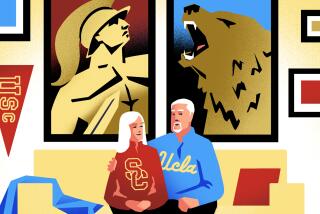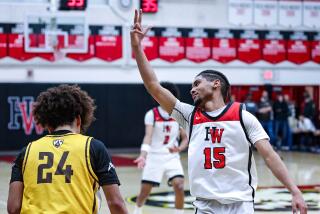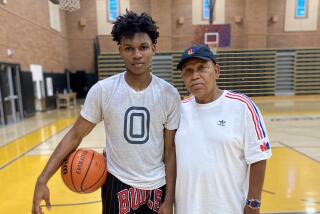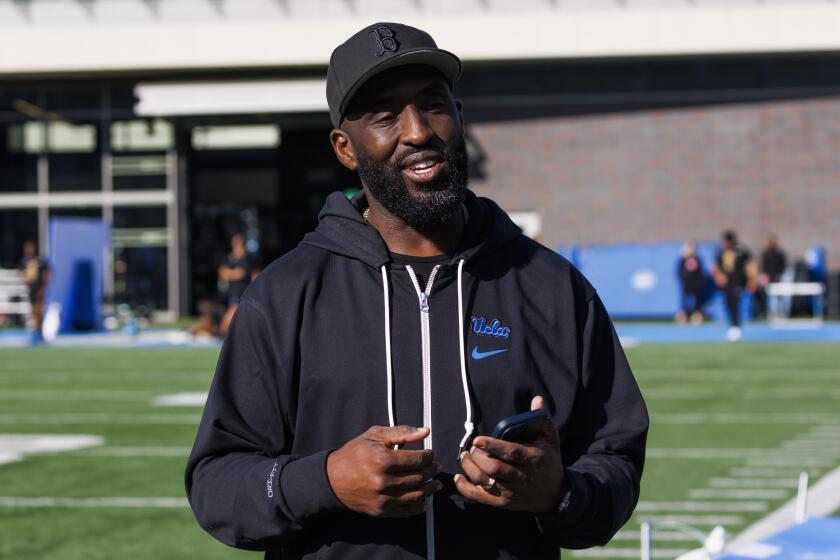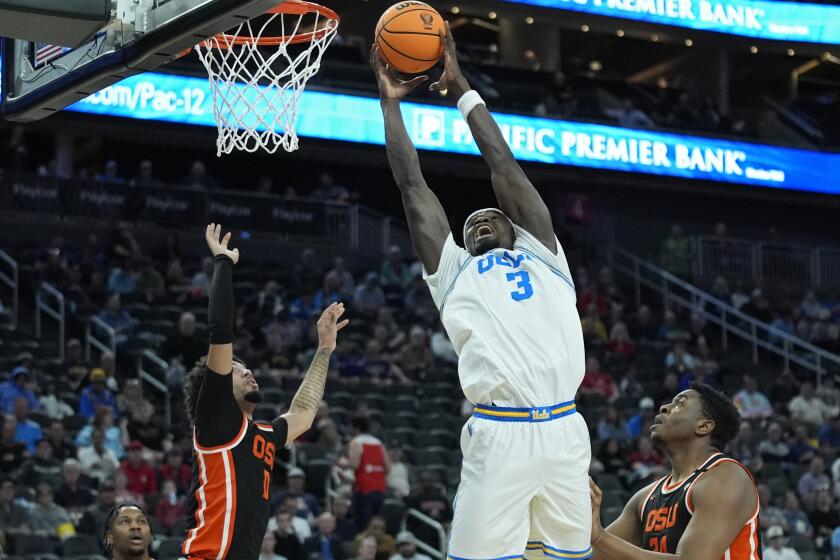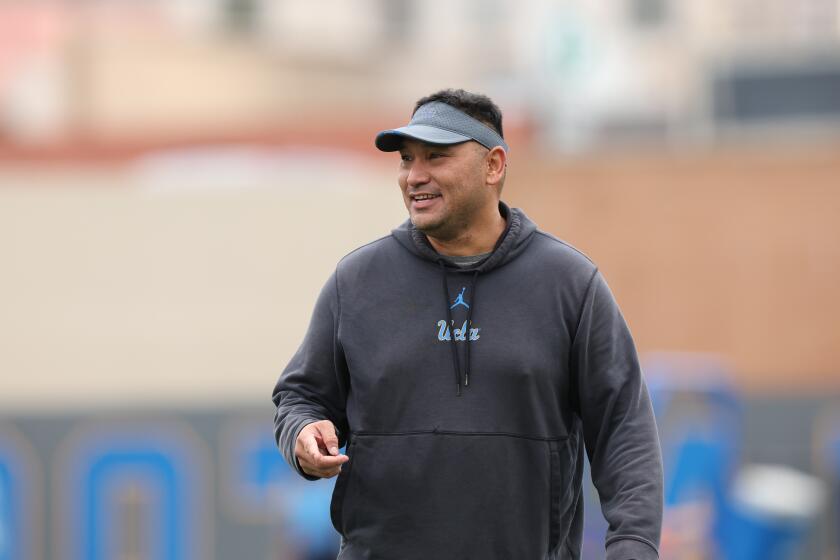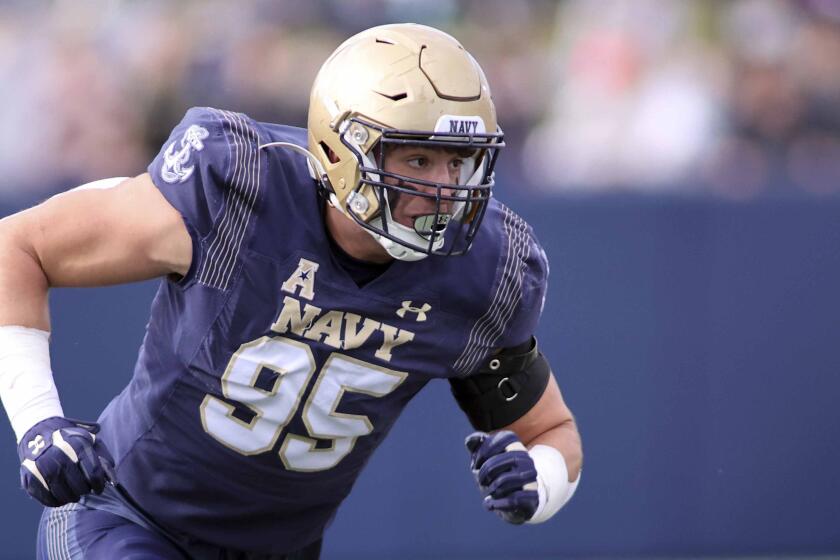Tough love, national championships made Jim Bush a UCLA legend
Academics were never a strong suit for Leroy Neal, whose grade-point average was just high enough to remain eligible for cross-country and track at Fullerton High, Fullerton College and Occidental College from 1955-63.
Even with an extra year at Occidental after his athletic eligibility expired, Neal was two classes shy of a degree in the spring of 1964. One week into summer school, he dropped out.
“I decided I’d rather go work for my dad as a carpenter, or in the car wash, or as a dishwasher — it didn’t matter, I had it with this academic stuff,” said Neal, a standout miler and 800-meter runner.
“I rented a tiny room behind a garage in Eagle Rock, and for 16 hours a day I’d lay on my bed, staring at the ceiling. One day I was pouting, feeling sorry for myself, and there was a knock at the door.”
It was Jim Bush, Neal’s coach in high school and college, and the man who would soon lead the men’s track and field team at UCLA.
“Coach Bush said, ‘What’s this I hear about you dropping out of school?’” Neal, now 76, recalled. “He grabbed me by the shoulders, shook me and said, ‘Leroy, you’ve got to go back. If you don’t graduate, it will be the biggest failure of my entire career.’”
Neal, in tears, agreed to return to school. He barely passed two Spanish classes and earned his degree from Occidental. He went on to earn a master’s degree in physical education from San Diego State and coached the track team at Cal Tech for 12 years and Biola for 19. Along the way, he wrote two books.
“It was a blessed career,” said Neal, now retired and living in Colorado Springs. “I look back on it, and I realize that everything I did came from Jim Bush.”
Bush, who died in his Culver City home at age 90 on Monday, was a legend at UCLA. His teams won five national championships and he produced dozens of Olympians. He was known as the John Wooden of track and field, and his cutting-edge training techniques helped develop several of the world’s best 400-meter runners, including Wayne Collett, John Smith, Benny Brown, Tyree Washington and Quincy Watts.
Coach Bush was a man’s man, a tough son of a gun, but he was tough because he was passionate about changing lives.
— Quincy Watts
To those who trained under Bush at Fullerton High (1952-59), Fullerton College (1959-62), Occidental (1962-64), UCLA (1965-84) and USC (1989-94), he was so much more than a coach.
“He was a mentor, a father figure, someone outside your immediate family who has pure love for you,” said Watts, who won two gold medals at the 1992 Olympics and is now a sprint coach at USC. “And he wasn’t selfish. He gave love to everybody.”
It was a tough love in many ways.
Bush studied the marathon-conditioning techniques of Arthur Lydiard, a New Zealander who was the father of modern distance running, and the training of Paavo Nurmi, a Finnish middle-distance runner who won nine Olympic gold medals from 1920-32, and Czechoslovakian distance runner Emil Zatopek, who won three gold medals at the 1952 Olympics.
Zatopek’s mantra, Neal recalled, was, “If you didn’t die a little in every workout, you hadn’t pushed yourself.” Bush took pieces from each and developed his own workout regimens with an emphasis on grueling uphill sprints.
At UCLA, Bush set a course along Sunset Boulevard that required runners to sprint uphill for a half-mile, run at a moderate pace along a flat surface for a half-mile, sprint downhill for a half-mile, and repeat. His USC athletes ran a similar course in the hills behind West Los Angeles College.
“One time I was laid out on my back, throwing up, and this lady walked by and said, ‘Are you all right?’” Watts said. “Coach Bush said, ‘Yeah, he’s just having a seizure, he’s gonna get up and be OK.’ I staggered down the hill and came right back up.
“Coach Bush was a man’s man, a tough son of a gun, but he was tough because he was passionate about changing lives and giving you the opportunity to be the best you can be.”
Bush was a football and track standout at Kern County Union High in Bakersfield, graduating in 1944. Following a stint with the U.S. Navy Air Corps in World War II, he ran track at Bakersfield College (1947-48) and Cal (1949-51).
After seven years at Fullerton High, Bush turned around a struggling Fullerton College program, leading the Hornets to a state title in 1961. His Occidental teams won three consecutive conference titles in track and field and cross-country.
When Bush took over from Ducky Drake at UCLA, the Bruins had won one NCAA title, in 1956, and had never defeated USC. Under Bush, who groomed stars such as Willie Banks (triple jump), Dwight Stones (high jump) and Greg Foster (hurdles), the Bruins won 13 dual meets against the Trojans and captured NCAA titles in 1966, 1971, 1972, 1973 and 1978.
“He built UCLA into a power,” said former track promoter Al Franken. “There was a great rivalry between USC and UCLA in those days — they had near-capacity crowds for their meets — and that helped the sport a great deal.”
Bush’s rugged good looks earned him a spot as a coach in a Budweiser commercial. His outspokenness earned him a reputation as a bit of a rebel.
In a full-page letter to the editor in Track & Field News, he criticized college coaches who recruited older foreign athletes. He fought for more scholarships and media coverage.
“He was candid,” said Larry Knuth, a former USC assistant coach who ran for Bush at Fullerton College. “He told it like it is.”
Disenchanted with what he perceived as cheating and the growing number of track athletes leaving college to compete at the club level, Bush resigned in 1984, telling the New York Times, “It’s just not any fun anymore.”
As a young athlete, to have a coach believe in you, to see some things in you that you don’t see in yourself, is amazing.
— Quincy Watts
Bush became a speed and strength consultant to the Lakers, Kings, Clippers, Raiders and Dodgers. He was elected to the National Track and Field Hall of Fame in 1987.
He had just started at USC as a volunteer coach in the fall of 1989 when he met Watts, a former Woodland Hills Taft High star who specialized in the 100- and 200-meter sprints.
“I remember walking onto the track, him pointing at me and saying, ‘Young man, you’re gonna be a great 400-meter runner,’” Watts said. “And I said, ‘No I’m not, I’m a sprinter.’ I wanted to stay as far away from Coach Bush as possible.”
Less than three years later, Watts won gold medals in the 400 meters and the 4 x 400-meter relay at the 1992 Olympics in Barcelona.
“As a young athlete,” Watts said, “to have a coach believe in you, to see some things in you that you don’t see in yourself, is amazing.”
Bush’s influence is reflected in the long list of former athletes who went on to be coaches, and he was a regular at UCLA track practice until last year, when his metastatic cancer worsened.
As hard-working, dedicated and prepared as he was, Bush couldn’t help but think that fate had played a role in his success. He told The Los Angeles Times in 2012 that his grandmother and mother, a young girl at the time, were left on the dock in England when the Titanic sailed in 1912.
Bush’s grandfather had already emigrated to the U.S. before sending for his wife and daughter.
“She had her luggage stolen on the dock,” Bush said, “so she couldn’t go.”
Bush was born in 1926, 14 years after the Titanic struck an iceberg and sank.
“My grandmother and mom would have had tickets on the lower part of the ship, where everyone died,” Bush said. “The first time I heard that story was the day I started believing in God.”
Bush is survived by his wife, Francoise; two children, Don Bush and Jean Richmond; two stepsons, Gary Ruggieri and Patrick Ruggieri; and 21 grandchildren and great-grandchildren. A memorial service will be held in August.
Follow Mike DiGiovanna on Twitter @MikeDiGiovanna
More to Read
Go beyond the scoreboard
Get the latest on L.A.'s teams in the daily Sports Report newsletter.
You may occasionally receive promotional content from the Los Angeles Times.

